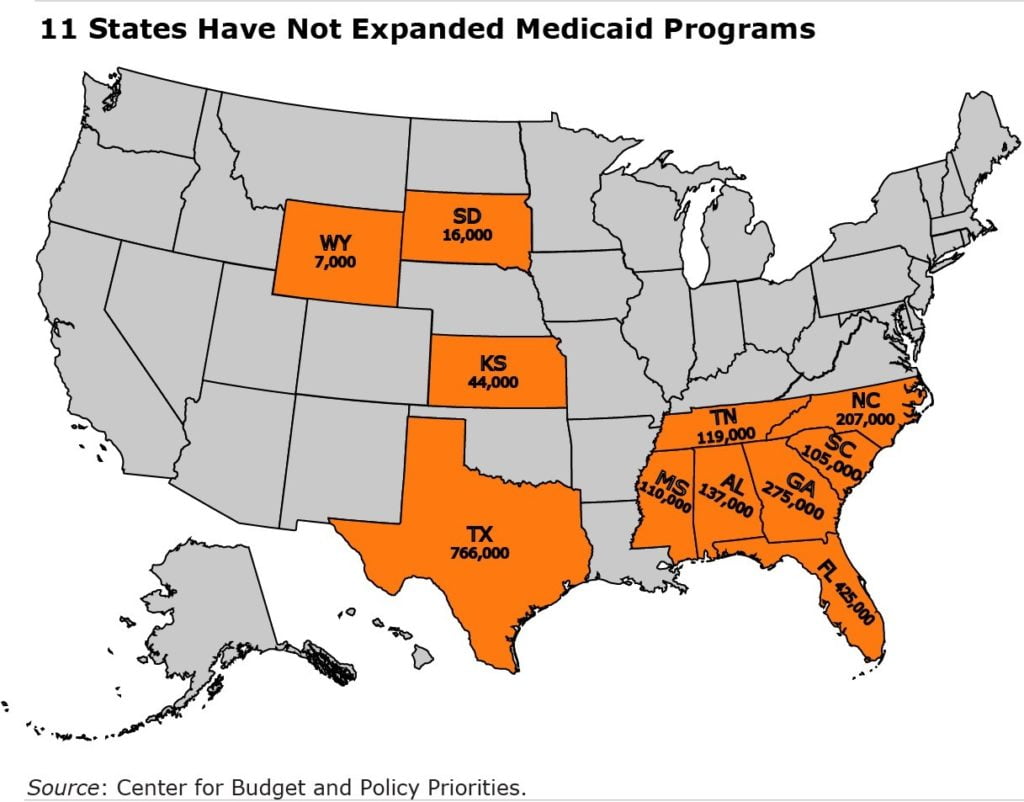
2.2 million Workers Left Out of Medicaid
The Affordable Care Act gives a carrot to states that expand Medicaid from a health insurance program mainly for poor people to one that also includes low-income workers.
Under the 2010 law, the federal government initially paid the full cost of adding more people to the Medicaid rolls, and a large majority of states have signed up. The federal funding for new expansions dropped a bit in 2020 to 90 percent and will remain there.
Yet 11 states are holdouts and haven’t expanded their programs, leaving nearly 2.2 million workers and family caregivers in what the Center for Budget and Policy Priorities calls the Medicaid coverage gap.

The workers falling in the gap, who would qualify for coverage if their states expanded Medicaid, do not have health insurance at their places of employment and can’t afford to buy subsidized insurance through the Affordable Care Act.
The bulk of the uncovered workers are in the South, with half in Texas and Florida. Missouri had been a holdout. But last week, the Missouri Supreme Court ordered the legislature to comply with a voter ballot initiative and fund expansion of the state’s Medicaid. Expansion was also controversial in Oklahoma, but it went into effect on July 1 after voters there approved the measure.
An analysis by the Center sketched a picture of who is in the gap, based on 2019 Medicaid data, the most recent available. People of color comprised about 40 percent of the working-age population but made up 60 percent of the people in the gap in the non-expansion states, the Center estimates.
Nationwide, one in four who lack access to Medicaid are lower-paid essential workers on the front lines during the pandemic. They work in grocery and retail stores, food production, health care, transportation, and other jobs. In the expansion states, Medicaid has been an effective way to expand insurance coverage to these workers: the uninsured rate for essential workers dropped by half between 2013 and 2019.
Expanding Medicaid in the remaining states, the Center said, would “increase health insurance coverage, reduce racial health disparities, and improve health care access, health outcomes, and financial security.”
Squared Away writer Kim Blanton invites you to follow us on Twitter @SquaredAwayBC. To stay current on our blog, please join our free email list. You’ll receive just one email each week – with links to the two new posts for that week – when you sign up here. This blog is supported by the Center for Retirement Research at Boston College.
Comments are closed.







The poor, including the working poor, bear the brunt of our failure to treat basic health care as a human right. Many have no health
insurance, and increasing numbers have poor insurance. with high deductibles and co-pays that cause them to skip needed care. We need to expand the public option NOW.
Kim, What are the reasons that these states have not chosen to expand Medicaid? This program is practically fully underwritten, it has all the benefits you enumerated for the recipients, and perhaps it would make the recipients more likely to vote for the existing state leaders. (Or is it just discrimination?)
Not every low paid worker would be better off on Medicaid than in the ACA market. Medicaid is means tested, so low paid workers with savings would not qualify.